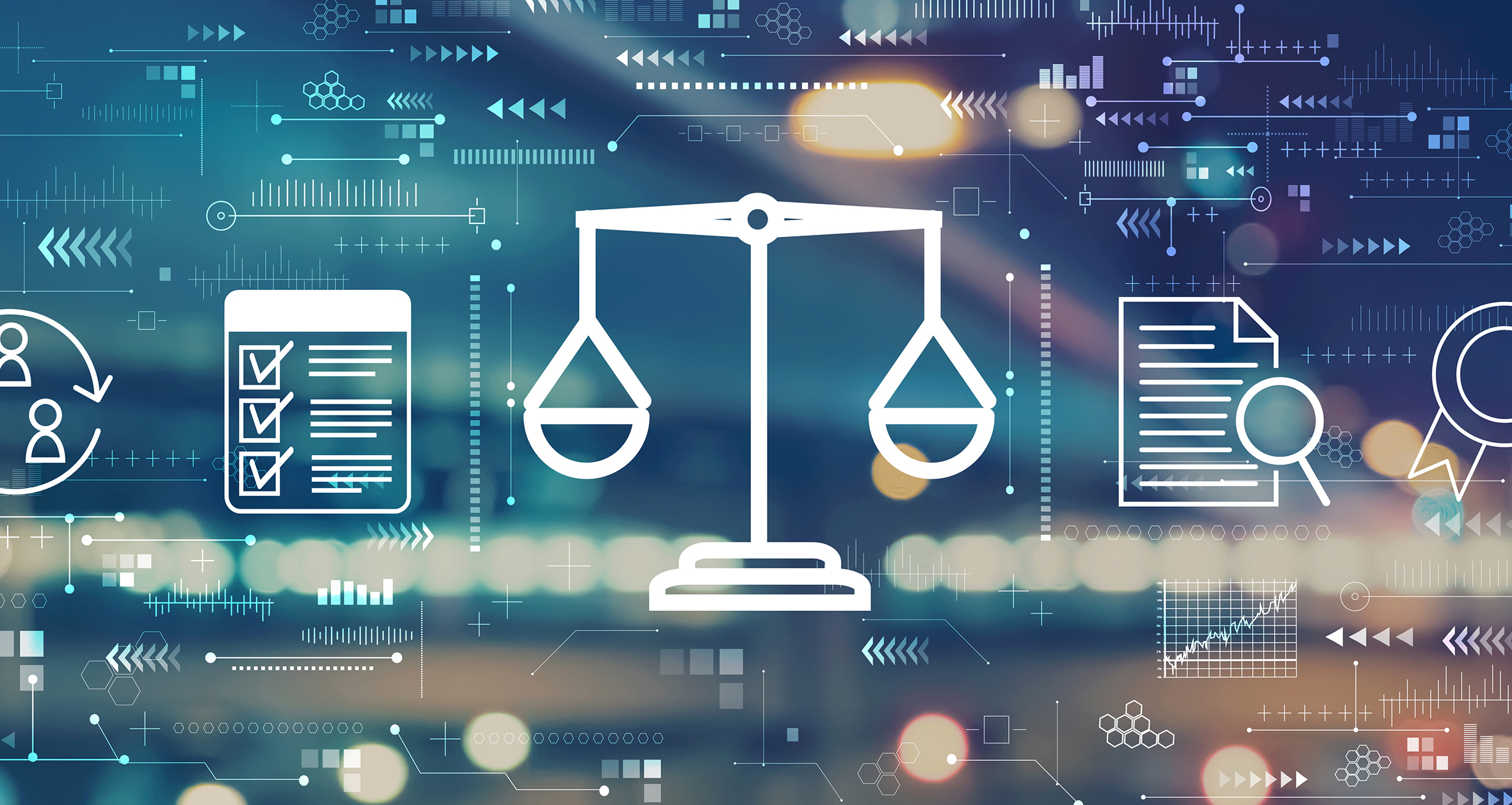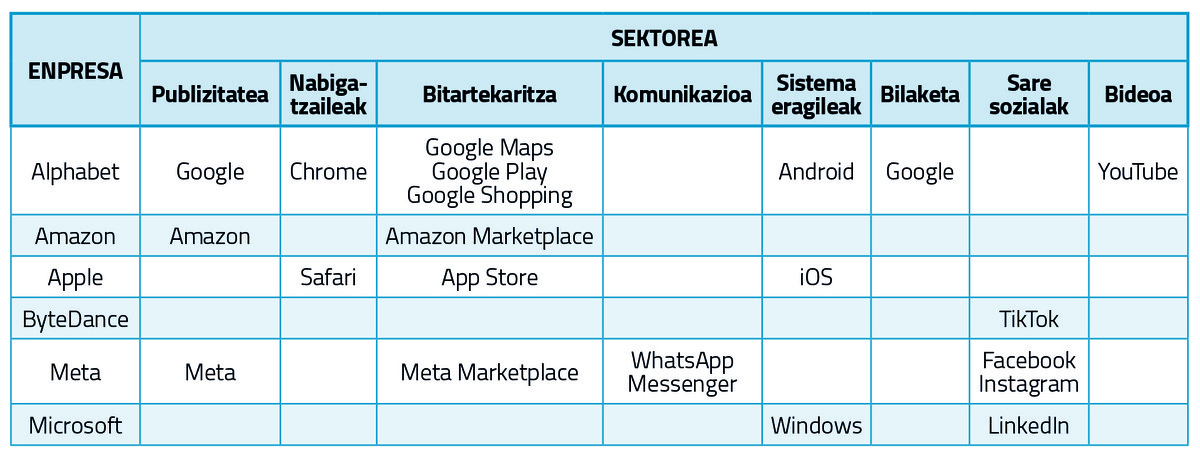New network regulation chapters
2023/12/01 Leturia Azkarate, Igor - Informatikaria eta ikertzaileaElhuyar Hizkuntza eta Teknologia Iturria: Elhuyar aldizkaria
The Internet, from its origin, has been very similar to the Far West, a new territory of exploration, without geographical borders or clear jurisdictions, where laws have often gone through rapid innovations and changes... And there the settlers and all kinds of adventurers and criminals, so have the technological giants, taking advantage of the legal loopholes, in many very dubious activities. But regulation once comes. In recent months, various network regulation laws are being implemented or promoted, which are giving much to see and which will be important in shaping the web of the future. Let's see what they consist of.

In the past we have also known the laws of network regulation. For example, some acronyms that may be known: Some Americans like DMCA, CDA, CAN-SPAM, and the Children’Privact Protective Regulations. Some of these laws have been made to regulate malicious behaviors of private users, such as piracy, cyberbullying, trolleying... Others to support the businesses of some companies or sectors, such as those affecting copyright accounts, or to boost the interests of governments, even if they are doubtful, such as allowing censorship.
However, it can be said that most of these laws are aimed at limiting business activities and protecting users. In fact, the multinational companies of the network are often working with very few scruples (without asking for permission, using closed protocols...), getting as much as possible (customers, our data, content...), and so they have become the richest companies in the world. And many companies also use the network for illegal activities in many countries.
It is true that these laws have been made a posteriori, but better late than ever. And yet, the impact has not been enough, as tech giants have continued to abuse and plunder more money than ever. Except for the last two laws cited, all the others are over 20 years old, and with the exception of both, there has been no other significant network regulation law in recent years. We know what the stuff of the pallet looks like and... However, new laws of this kind are now in force for companies.
EU Digital Services Act
The so-called DSA (Digital Services Act) or Digital Services Act was adopted in the European Union in July 2023. The aim of DSA is to regulate the practices of moderating the content of social media platforms and to deal with illegal content. This Law is responsible for the illegal content of companies that host and publish information, data or other content, provided that they are warned and do nothing about it, as well as sales intermediaries that contain false information. Just against what the equivalent American law, the CDA, does, which gives these intermediaries a great immunity.
It also imposes on platforms new obligations such as the obligation to explain to regulators how their algorithms work and transparency in decision-making to remove content and the reach of advertisers towards users. Users should also be able to see the content without any algorithm, requests for authorization should be clear and give access to the contents to researchers.
The Act concerns only large platforms, in particular those with at least 45 million active users in the EU per month, but includes almost all known social networks, content platforms and web services: Aliexpress, Amazon, Booking, Google Shopping, Zalando, AppStore, Google Play, Facebook, Instagram, LinkedIn, Pinterest, Snapchat, Tik Tok, X, YouTube, Google Maps, Bing, Google Search and Wikipedia.
The importance of this law is reflected in the lobbying efforts made by Big Tech companies to soften it. And it is affecting: in September the EU warned X that it would have to make changes, after seeing that it is the social network with the highest rate of misinformation, and in October it again drew attention to the abundant illegal and odious content of the attacks in Gaza in Israel. This threatens X to leave Europe. It is therefore clear that the law has a potential for positive effects, if it can lead to the disappearance of this toxic network and give rise to the impulse of decentralized social networks such as Mastodon. But it is true that it is also at risk of censorship, which content is considered illegal ...
Digital Markets Act, also EU
The DMA or the Digital Markets Act also entered into force in May. Its aim is to ensure competitiveness in European digital markets, preventing large companies from abusing their power position to make it difficult for new players to enter the market. Thus, the law calls “gatekeepers” the largest digital platforms and imposes a number of obligations and prohibitions on them. These “gatekeepers” are 22 services owned by 6 companies operating in 8 sectors (in the table below).

Concerning the obligations and prohibitions, the most significant are the prohibition of combining data collected from two services of the same company, such as Facebook and WhatsApp; the provisions to protect users of platforms, including advertisers and publishers; the prohibition of platforms from prioritising their own products (e.g. the Google search engine prioritizes their products); the provisions on the pre-installation of certain services in operational systems; and interoperability, They must comply with these instructions by March 2024.
And it is clear that this law will also have very positive consequences. For example, by imposing mandatory interoperability on instant messaging applications, Whatsapp and Facebook Messenger should allow communication with other applications (Telegram, Signal, Snapchat...) and thus be able to approach the decentralisation of communications, as we have been calling for for a long time. Unfortunately, it seems that at the moment they will not favour interoperability between social networks... but at least portability, and that all our data can be transferred from one social network to another is not a slow victory.
ACCESS and other US laws

On the contrary, it appears that the US Augmenting Compatibility and Competition by Enabling Service Switching will force social networks and other platforms to be interoperable, in addition to offering portability. However, although the law was passed by Congress and the Senate in 2021, its entry into force is subject to new phases of concretion and legality, so it remains to be seen what it will materialize and what it will be forced into. The AICO (American Innovation and Choice Online) and OAMA (Open App Markets Act) laws are in the same situation, accepted but in specifications and legality studies. The first aims to prohibit online shops and search engines from prioritising their products or hindering competition, and the second aims to do the same in app stores (Google Play and App Store).
As you can see, similar things are being regulated in the Atlantic. To see if we can finally stop the large multinationals in the network and have in future a better web, with decentralised services that are not monopolies of a few companies, that respect privacy and that are not dedicated to all kinds of traps.

Gai honi buruzko eduki gehiago
Elhuyarrek garatutako teknologia





